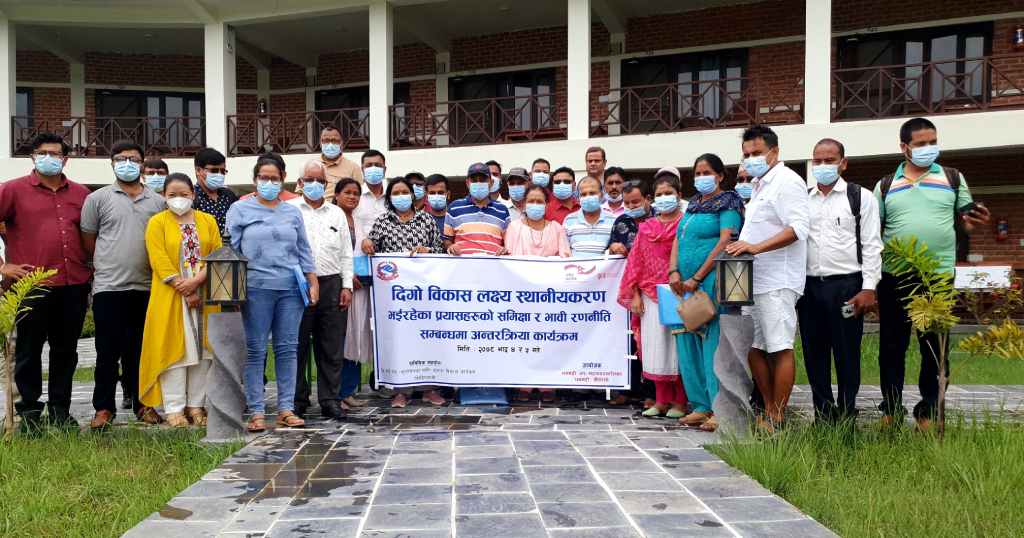Supporting the integration of SDGs in local planning and service delivery

© Nepalgunj Sub Metropoliton
Nepalese urban areas have been marked by considerable administrative changes over the past years. Sixteen selected municipalities in provinces of Nepal used the City WORKS approach and drew several lessons. Nepalese urban areas have been marked by considerable administrative changes over the past years. Nepal’s local governments exercise comprehensive functions related to service delivery and development; hence they play a central role in implementing the SGDs. Although highly committed, local governments are not well-equipped and need support in implementing the necessary reforms to be effective and fully functional. Moreover, the government agencies are in need of strategy, guidance and support in preparing the extensive reforms at the national and local levels.
To help local governments in this process, the project “Strengthening the decentralised government structure in Nepal”, or Capacity Development Support to Governance (CD-SG), has been implemented. Funded by the German Federal Ministry for Economic Cooperation and Development (BMZ) and implemented by Nepal’s Ministry of Federal Affairs and General Administration (MoFAGA), its main goal is to strengthen inclusive service provisions in fifteen selected municipalities in provinces of Nepal. The envisioned output of applying the City WORKS approach is the integration of the SDGs in the 7-step local planning process and an inclusive service delivery in different sectors.
From raising awareness to SDG-proofed plans
Within this project, the City WORKS approach was used with the objective of reviewing and adapting project activities and processes for facilitating local-level planning and inclusive service delivery and linking them with the SDGs. During initial scoping / internal capacity development sessions, different entry points and links to project outputs and City WORKS tools were identified and assessed. Detailed workshops with the project team (including technical and regional staff – seconded to work also directly with municipalities) followed, to train/coach the project team in the overall methodology of City WORKS. This included application of selected tools and focus-group work between workshops. An important milestone of this step was achieving a detailed application structure and roadmap for implementing City WORKS on the ground. For this task, a national consultant was engaged and mentored by the CD-SG team. In parallel, a readiness check with mayors and municipal representatives took place, with the final selection of three municipalities: Dhangadhi, Nepalgunj & Bheriganga.

© Jeevan Shrestha
The main target group for the initial awareness-raising workshops in the selected municipalities were senior officials, but there were participatory sessions also with non-state actors, including other donor organisations such as UNDP, to create a common understanding of the process. In Dhangadhi, for example, after the initial sensitisation, two-day workshops were conducted with civil society and private sector representatives, as well as municipal staff. As a very important step, a task force was established to review existing efforts of the municipality in terms of the localisation of SDGs. This step focused on understanding indicators and monitoring mechanisms for selected goals and targets, as well as identifying gaps and areas of interventions to minimise these gaps, also backed up by the SDG wheel exercise. Moreover, participants had the opportunity to perform a detailed stakeholder analysis and cause-and-effect mapping, as well as an exercise to link identified potential strategies for the localisation of the SDGs to new intervention areas with their current Periodic Plan, Mid-Term Expenditure Plan & Annual Plan. In that sense, a localisation action plan for the municipality was then drafted and reviewed. The refined document was presented in the municipal executive council for approval, after which activities were initiated.
Partnerships for impact
From these experiences, several lessons can be drawn. A success factor is the creation of multi-disciplinary expert teams within city administrations to lead the whole process as a taskforce, under the guidance of a steering committee headed by the City Mayor. Senior municipal staff are a key part of the task force since they are responsible for the preparation of the annual programme and budget. Possible experts/consultants that help facilitate the work of such a taskforce can be quite essential, while also providing technical inputs. This is an effective format to build ownership for the localisation process from the very beginning.